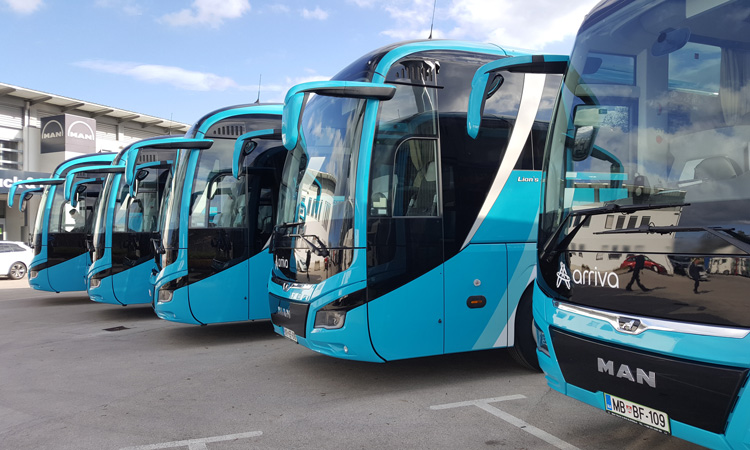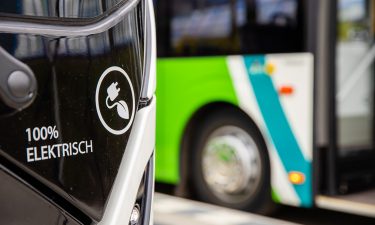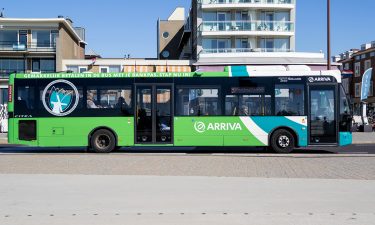Tech, workforce and governance: managing a pan-European transport network
- Like
- Digg
- Del
- Tumblr
- VKontakte
- Buffer
- Love This
- Odnoklassniki
- Meneame
- Blogger
- Amazon
- Yahoo Mail
- Gmail
- AOL
- Newsvine
- HackerNews
- Evernote
- MySpace
- Mail.ru
- Viadeo
- Line
- Comments
- Yummly
- SMS
- Viber
- Telegram
- Subscribe
- Skype
- Facebook Messenger
- Kakao
- LiveJournal
- Yammer
- Edgar
- Fintel
- Mix
- Instapaper
- Copy Link
Posted: 30 April 2020 | Liz Benison - Arriva | No comments yet
At the beginning of the year, Liz Benison, Managing Director, Mainland Europe, at Arriva, spoke with Intelligent Transport to explain the multifaceted challenge of managing public transport networks across Europe, including ways to attract and retain staff, and why smarter collaboration is needed to keep innovation front of mind.


What would you say are the biggest priorities for Arriva?
Clearly, our most important priority is keeping our colleagues, customers and the communities we serve safe during the unprecedented global coronavirus crisis. I have responsibility for our operations in the Netherlands, Denmark, Slovakia, Slovenia, Croatia and Serbia, and in each case, we’re closely following government and health authority advice and guidelines.
Now, more than ever, we can see the vital role that our passenger transport services play in our communities. Our services are crucial in helping to tackle the virus, by enabling essential workers to get to where they need to go. Although we’ve had to reduce the frequency of our services in most countries, our focus is on continuing to safely deliver services, wherever possible, so we can help those who help us.
It’s all about data, and what’s really interesting for a company like Arriva are the opportunities to work with some of the new sorts of companies in this space, as well as building up our in-house expertise
Eventually we will get out of this crisis and we will need to be ready to tackle some of the other challenges facing society and this is where public transport can play a crucial role. For many of our PTAs, particularly those in more developed markets, moving to zero emission fleets will continue to be a key priority. For example, in the Netherlands we will be operating approximately 300 electric buses by the end of 2020, with plans to be almost completely electric in most of our Dutch contracts from now on. We’ve most likely purchased our last ever diesel bus in the Netherlands, but it’s very different in a locality like Slovenia, for example, where e-mobility is still at the pilot stage.
The Netherlands is a really interesting market because sustainability is not just about zero emissions, it’s also about ensuring that public transport can support local economies and make a positive impact on society. For example, we’re asking how migrants to the Netherlands, or people whose first language is something other than Dutch, and people with disabilities, can be included and integrated in the workforce.
Naturally, as part of this, we’re doing a lot of work around gender and inclusivity, looking at how to change the nature of the workforce in public transport to be more representative of the customer base that we serve. It’s something that is very much on the agenda of the PTAs as well and is increasingly part of the tendering process and how we operate.
As the public transport space becomes more tech-led, do you think that transition is encouraging new and different types of people into the industry? Are there any other factors at play here?
We do a pan-European graduate intake, and back at the start of the year, we welcomed them all to London. There were graduates from Croatia, Slovenia, the Netherlands – all over Europe – and when asked why they chose Arriva above their other options, the most popular answer was that they saw it as a way of practically saving the planet. It’s fascinating to see a real generational shift in why people are coming into the industry. I think we’ve really got to build on that and use that to drive purpose.


How important is it for modern day transport operators to get their approach to data handling right, and what kind of role do vendors and start-ups play in that?
It’s all about data, and what’s really interesting for a company like Arriva are the opportunities to work with some of the new sorts of companies in this space, as well as building up our in-house expertise. Public transport operators are going to have to adapt to be able to work at the pace that their new partners are going to want to work at. A key challenge is picking the right partner – there are so many options out there, how do we pick the five or six winners? The other area where we’re facing the same kind of challenge is with new mobility. I absolutely believe it is an enabler for bolstering mass transit, and we’re going to have to become more intelligent at working with those sorts of organisations.
Is the pace at which innovation and change happens through technology in public transport an issue in partnering with new mobility organisations, because it tends to be slower than in other sectors?
I’m still relatively new to this sector but I do think digital enablement has come late to transport compared to something like retail or banking. For us, there’s a challenge in assessing the hundred or so vendors out there offering similar solutions, and then picking the right ones to work with. It also requires a bit of a change in approach, to say that one partner might be good enough for today, so let’s run with it for six months and then we’ll learn from that. I come from a tech background where ‘fail fast’ is well-embraced, whereas in transport, there’s a tendency to try to focus too much on making the right decision for the longer term.
Learning at the local level like this is something we’re having to get better at because I think the danger of top-down is that it can miss that local ingredient that is really important in public transport
But that tendency is being flipped as a result of the unprecedented disruption caused by the global public health crisis. Nobody could have anticipated the widescale curtailment or closure of public transport networks, yet this is the reality in which many of our countries now find themselves. If I can take one emerging lesson from the impacts of this pandemic on the business, it is how agile our people have been in their response, taking difficult decisions to protect our customers, our staff and our business. Changes that would normally have taken us months to execute, have been taken in a period of days as we’ve not had time to wait. My hope is that we can maintain this agile approach in our future thinking.
With technology and job roles changing, do you think we might see more instances of operators turning to in-house developed solutions to be able to work more on their own terms?
Arriva’s point of view is that we need to be integrators of that technology. I don’t think we’re going to be a big development shop, but we do a little in-house development where needed. Ultimately, we need to be smarter buyers and work in collaboration with more technology companies. I think there’ll be a lot more examples of transport companies partnering more strategically to get access to IPR and to resources for full solutions. I think we see ourselves as the integrator of those solutions rather than the owner, with a view that you can then swap out components if they don’t quite work and bring in another one. Again, that’s a new mentality for the industry to adopt. The time has come for us to start plugging and playing and looking at what’s new and shiny out there to help us find a USP and give us a step up in the market.
From an organisational perspective, do you think that attitude has to filter through a company from the top down?
I think there’s a balance to be struck; there is some top-down thinking going on around what disruption means in this industry, but it’s also critical to listen to local voices as well to understand challenges facing PTAs and the mindset of their travellers. We will see breakthroughs with little innovations by having those conversations, and they can then spread quickly. That is, again, another adjustment for public transport companies to make.
We have some great innovations coming out of the Netherlands in particular, but it’s not just technology. For example, we’re adopting new approaches to rural bus services in the Netherlands, where the community takes a greater role in owning and running their local transport. This enables us to provide services to small villages and hamlets where it would otherwise be commercially unviable to do so. It’s a small lesson, but a really valuable one in terms of the service we can now provide. It’s not technology, but it is innovation. It’s a case of replicating that kind of lesson and success in any environment where it’s applicable as quickly as possible.
We need to be smarter buyers and work in collaboration with more technology companies
Learning at the local level like this is something we’re having to get better at because I think the danger of top-down is that it can miss that local ingredient that is really important in public transport. We don’t have global customers; we are there to serve specific communities. This obviously comes with its own challenges because we’re operating in so many different markets, which means adapting to different legislation and economies.
What’s really interesting, though, is that innovation can still come from anywhere in those markets. For example, our business in Serbia was the first across the portfolio to introduce driver coaching around fuel efficiency and passenger experience. The thought behind this was that if you can coach the drivers to drive more smoothly, corner better and not idle in the same way, you can both save on fuel and improve passenger experience. Doing this requires data, so they found a partner and developed technology that could be fitted in buses. Using the data that they collected, they could then sit down with the drivers and analyse the way they drove and advise them on how to improve.
Serbia was doing these seven or eight years before anywhere else in our network. You tend to think that more mature countries would be the ones where innovation happens, but actually it can come from anywhere.
Working with a view of so many different markets, do you ever find it frustrating to see some markets seemingly behind the curve where they shouldn’t be?
My job is to help join the dots between the businesses, and not slow them down. Our customers are regional and local, so our front-end has to match that. We want them to go as fast as they possibly can, but we want them to be very cognizant that maybe we’ve done something similar somewhere else, and that’s really my job and my team’s job. The challenge is getting people to talk and really understand that the issues they’re facing and trying to solve are very similar to people elsewhere that already have a solution in place.
Our experience and expertise give us the advantage of being able to take a long-term view in how we behave and operate
PTAs really appreciate that as well. If we can show them a portfolio of successful implementations from across Europe, that spurs them on to think differently as well. That’s the beauty of working across 14 countries – somebody has always done what you’re trying to do, it’s just a question of making sure you find it and have the right mindset to apply it.
In some cases, it’s the smaller countries where we get some of the most creative solutions, as having fewer resources means they naturally have to solve problems in different ways. Sometimes one of these creative solutions from a smaller country can be of real benefit to a bigger country.
In the same way, what kind of challenges do you encounter working across all these different countries when it comes to different regulation and different ways of operating?


In terms of challenges, the cultural adjustments are really interesting. We are a big company that is UK headquartered with a German parent, and with the exception of Serbia all of our businesses are in the EU. It can be difficult to apply the same standards across all of those markets. For some of the smaller countries, it’s not a level playing field because we are competing against local operators that don’t necessarily have the same high level of standards that you’d expect from a company like Arriva. Our experience and expertise give us the advantage of being able to take a long-term view in how we behave and operate.
In the medium term, it will stand us in good stead because, as the EU lifts up standards, we will already be operating in that way. In some of our markets, for example, our engineering standards are higher than the local engineering standards. There’s a cost to that, but in the long-term I think that’s a good thing.
Biography
Liz Benison joined Arriva in September 2018 as Managing Director, Mainland Europe with responsibility for growing Arriva’s presence in Croatia, Denmark, The Netherlands, Serbia, Slovakia and Slovenia. She sits on the Arriva Management Board and is responsible for growth and innovation to support the specific passenger transport solutions required in those markets.
Prior to joining Arriva, Liz was Divisional Chief Executive leading one of two operating divisions for Serco Group in the UK and Europe. During this time, she took on global responsibility for the Gender Diversity agenda.
She has also held leadership positions at CSC Computer Services Company, Capgemini, Xansa/ Druid, was a senior analyst at Ford Motor Company and spent time at Jaguar Cars plc.
Liz is a non-executive director on the board of Openreach, the infrastructure provider of the UK’s internet economy, where she also sits on the Audit and Remuneration committees.
Liz has a BsC in Production Engineering and Management from the University of Nottingham.
Related topics
Fleet Management & Maintenance, Public Transport, Staff & Skills Development, Vehicle & Passenger Safety, Workforce Inclusivity
Related modes
Bus & Coach
Related cities
Europe
Related organisations
Arriva







